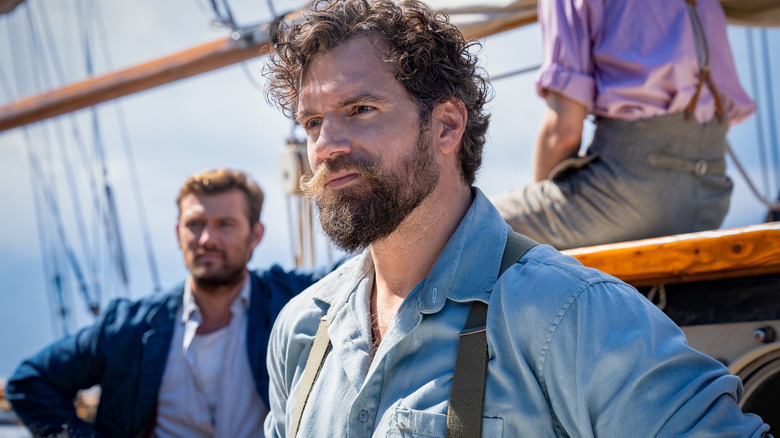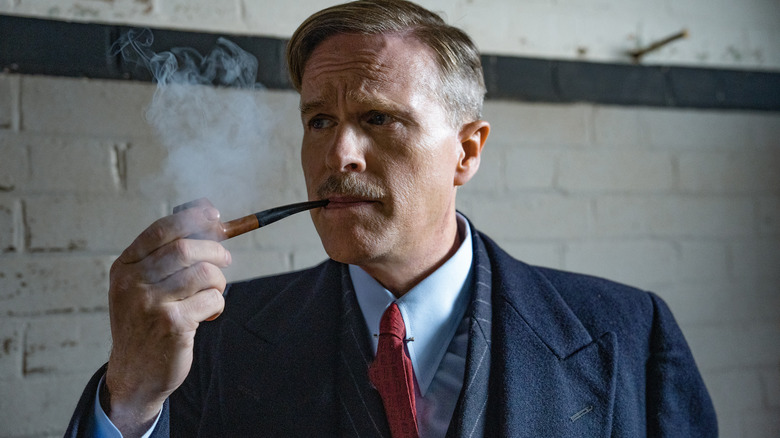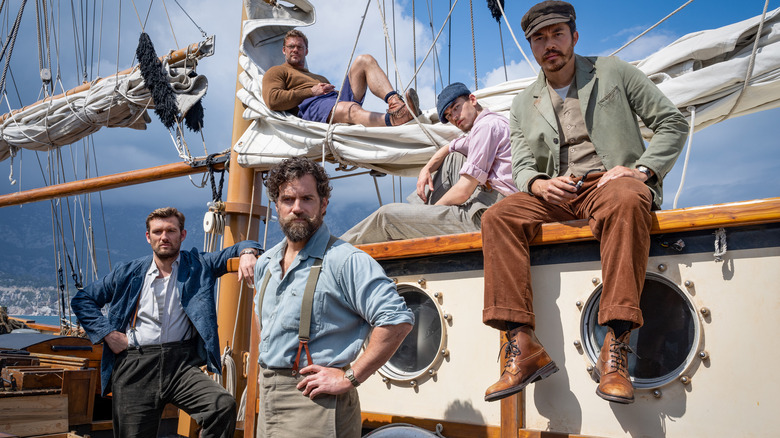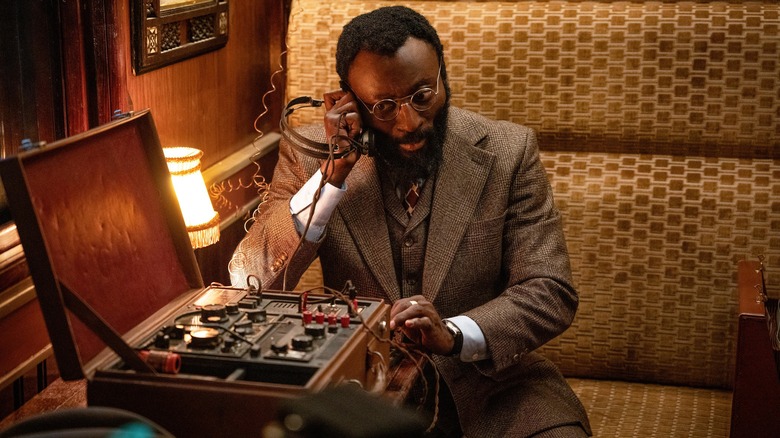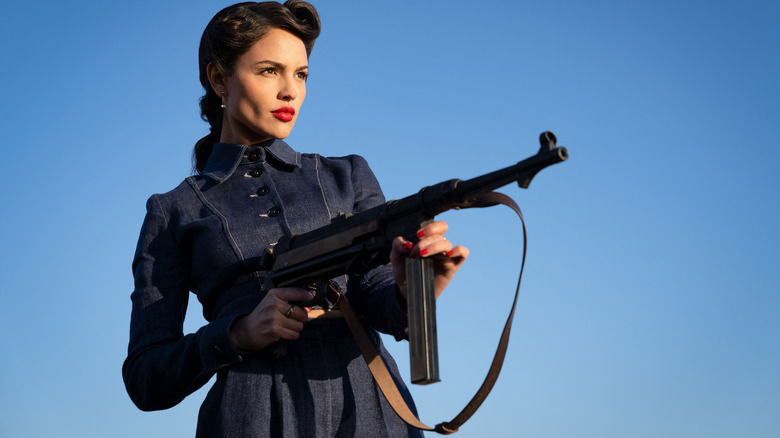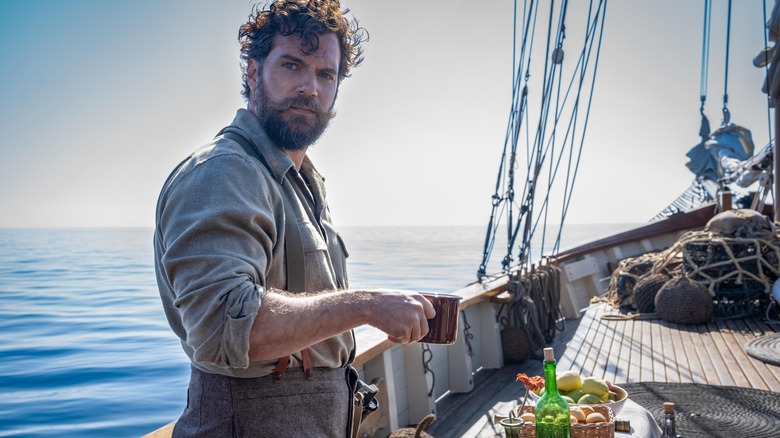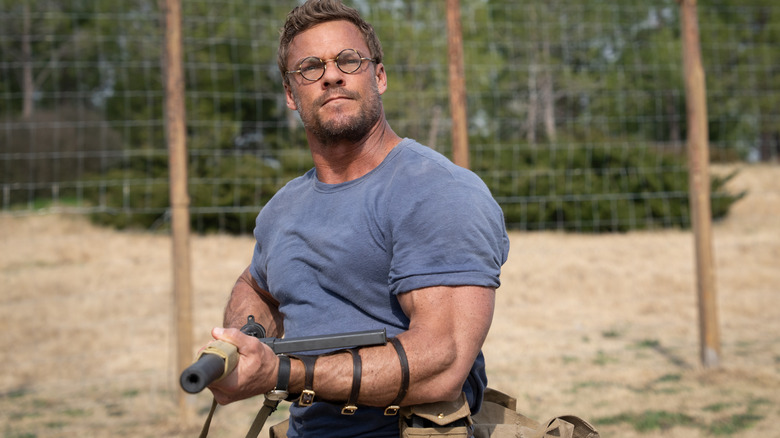The Tough Guys Of The Ministry Of Ungentlemanly Warfare, Ranked By Badassery
Warning: This article contains spoilers for "The Ministry of Ungentlemanly Warfare."
With the sole exception of Zack Snyder (whose newest film, "Rebel Moon: Part Two," just released on Netflix), there might not be a director currently working who is more fascinated by telling stories about tough guys committing violent acts while barely breaking a sweat more than Guy Ritchie. From his earliest works like "Lock, Stock and Two Smoking Barrels" and "Snatch" all the way to "The Gentlemen" (which, hilariously enough, was originally titled "Toff Guys"), "The Covenant," and "Wrath of Man," the British filmmaker has been all too happy to stay in his lane and pump out his unique brand of action movie year in and year out. This week's "The Ministry of Ungentlemanly Warfare," however, might as well be the poster child for Ritchie's overriding obsession.
The World War II-set film is based on a real-life historical event, which lends an even greater novelty factor to his depiction of Major Gus March-Phillipps (Henry Cavill), Anders Lassen (Alan Ritchson), and the rest of their motley crew of madmen. The elite team of commandos is tasked by no less an authority than Winston Churchill himself (Rory Kinnear) to covertly infiltrate the Spanish port of Fernando Po, located in neutral political territory, and destroy an Italian vessel known as the Duchessa in order to deliver a killing blow to the German supply line — which allows their fleet of U-boats to patrol the Atlantic Ocean almost entirely unthreatened and prevent the United States from entering the war effort.
As fun as the movie is (for more on that, you can read my review for /Film here), nothing else pops quite like the antics of our main (anti)heroes. So, without further ado, here's our official ranking (in ascending order) of the film's most badass characters.
6. The honorable mentions
Look, we had to start this list somewhere. In fact, in deference to a pair of phenomenal character actors, I'm using this ignominious spot in the ranking to heap praise on both Cary Elwes and Rory Kinnear ... even if their characters can't exactly be considered "badass" in the context of the film. Kinnear portrays Winston Churchill, the brainchild of this covert black op known as Operation Postmaster and who faces either surrender at the hands of the Nazis, or annihilation in the European theater should the world find out that Britain defied political neutrality and sovereignty to carry out an attack in foreign waters. Meanwhile, Elwes plays Brigadier Gubbins, more commonly known as "M" — yes, the same title as the character from the "James Bond" novels and movies. That's no coincidence, either, since "Bond" author Ian Fleming himself appears in the flesh, played by Freddie Fox.
All three appear in the film essentially as glorified cameos, appearing in only a handful of interior sets to establish the stakes of the mission and gently prod the unpredictable March-Phillipps into assembling his team. So, no, they don't exactly get their hands dirty in the middle of the action. And one of these men comes loaded with quite a historical black eye, having gotten his hands dirty in a much more sinister way through racist policies and mass starvation that many argue was attempted genocide — so not exactly "badass," either! But Kinnear and Elwes certainly make the most out of minimal screen time, barking orders and delivering priceless reaction shots to make every one of their seconds count. And, most notably, Kinnear does so from underneath quite a bit of prosthetics and makeup, making his performance that much more impressive. Hat's off to you, fellas!
5. The unsung heroes
Nobody wants to besmirch the reputations of individuals who, by all accounts, were basically war heroes. I get it! But since two, in particular, were heavily fictionalized for the purposes of the film while the third was flat-out invented, I don't feel quite so bad about putting them this low in our ranking. Henry Golding plays demolitions expert Freddy Alvarez, while Hero Fiennes Tiffin portrays sailor Henry Hayes and Alex Pettyfer plays so-called "Surgeon with a blade" Geoffrey Appleyard. All three are members of March-Phillipps' gang of misfits and take part in the two big set pieces throughout the film — a raid on a Nazi battalion to recover Appleyard from the clutches of the enemy, and the climactic sequence in Fernando Po. But apart from their very specific skill sets, the film's screenplay doesn't devote a ton of time and space to their heroics. It's a credit to each of these actors that they manage to make any impression at all but, apart from a bare minimum of action hero moments (Freddy blows up a Nazi warship in the opening scene, Henry gets to man a machine gun turret and wreak some havoc on German soldiers midway through the film, and Geoffrey provides most of the trio's thrills in a tense shootout aboard the Duchessa), none are particular standouts in the "badassery" department. Them's the breaks, sadly!
4. Richard Heron
Now we're getting somewhere. The character of Babs Olusanmokun's Richard Heron was invented wholesale for the film, providing Eiza González's Marjorie Stewart with a compatriot and a fellow secret agent on the shores of Fernando Po to carry out a mission of almost equal import to the raid itself — distracting and sabotaging the enemy soldiers occupying the port, namely the Nazi villain Heinrich Luhr (Til Schweiger). Heron plays the most obvious homage to "Casablanca" in the entire movie, taking on the Rick Blaine role as a casino bar owner who counts both sides of the World War II conflict among his clientele ... though his loyalties to the good guys obviously win out.
While the nature of his role demands secrecy and subterfuge, Heron has plenty of moments to shine. He gets to plant bombs, shoot some nosy Nazis who found themselves in the wrong place at the wrong time, and successfully warn the raiding commandos of a snag in the plan that forces them to rethink things on the fly. By the end, Heron even manages to save Marjorie's life at a critical moment and usher her away to safety. And we'd be remiss if we didn't point out that he does all this while looking like a debonair fashion guru. For someone with perhaps the most to lose in a tussle with German forces, Heron repeatedly stands out as one of the most integral and badass members of the op.
3. Marjorie Stewart
Much of the World War II-era genre of movies lend themselves to being told from the perspective of white men, but that always comes at the expense of undervaluing the contributions of everyone else who played a part in taking down Nazi fascism. Unlike Heron, the character of Marjorie Stewart was actually based on the real-life figure who eventually married March-Phillipps ... but there's no real historical truth to the idea that she actually participated in Operation Postmaster. So it's actually quite refreshing that Ritchie and his co-writers Paul Tamasy, Eric Johnson, and Arash Amel decided to throw real-world accuracy to the wind in favor of a much more entertaining depiction of the events.
We're told (and, in one memorable sequence, shown) that Stewart is a crack shot with a gun, an exceedingly clever combatant at wordplay, and a fearless undercover operative who doesn't shy away from arguably the most unpleasant role in the entire mission: cozying up to and seducing Nazi commander Heinrich Luhr. Though her narrative function in the movie can't help but feel a bit regressive and dated, Eiza González all but refuses to let her performance be defined by such tropes. Her steely gaze and line deliveries, pitch-perfect tonal juggling act, and even an extravagant singing performance (much of which is delivered in German) taking full advantage of her bombshell charisma makes her a constant scene-stealing presence and proves that there are many different flavors of badass.
2. Major Gus March-Phillipps
If you thought Henry Cavill's performance in Ritchie's "The Man from U.N.C.L.E." or his villainous turn in "Mission: Impossible – Fallout" was as charismatic as it gets, think again. Here, the actor taps into precisely the kind of vibe he works best in: smooth as hell, utterly roguish, slightly unhinged, and boasting some killer facial hair. Although "The Ministry of Ungentlemanly Warfare" never really dwells on why the recently incarcerated Major Gus March-Phillipps is the one and only man for the job of leading this black ops mission, Cavill more than fills in the gaps himself through sheer commitment to this brand of manic energy. When he isn't driving "M" crazy by pilfering his alcohol cabinet, stealing Ian Fleming's cigarette lighter, or trolling the British soldiers stationed outside with the promise of some free cigars, March-Phillipps channels all his brute force into killing Nazis and thoroughly loving every moment of it.
With a sociopathic twinkle in his eye and a killer quip ever at the ready, the good Major makes enemies of tenuous British allies and German foes alike, carving a bloody path from the Canary Islands to Fernando Po. Best of all, he constantly makes it look unbelievably cool, whether dressed in his ratty seafaring outfit or stealing snazzy-looking coats from dead Nazi officers. Forget about Superman or the Witcher — this is the kind of role Cavill was born to play. It's fortunate for all of us that Ritchie apparently felt the same way.
1. Anders Lassen
Honestly, who else could possibly even be considered for the top spot in this ranking? Alan Ritchson might be best-known among audiences for his role on the Prime Video series "Reacher" or his appearance in "Fast X," but no other performance is likely to earn the muscle-bound actor more acclaim and recognition than his portrayal of real-life figure Anders "The Dutch Hammer" Lassen. The hulking Dutchman introduces himself in the opening sequence aboard a yacht as he and March-Phillipps attempt to fool a Nazi boarding party by pretending to be Swedish sailors on holiday. Though his accent is as unconvincing as his glasses are incomprehensibly tiny, his true usefulness comes into focus when the jig is up and he unleashes his physicality on the hapless Nazis who happen to stand in his way.
From there, Lassen gets to use everything from his bare hands to his trusty bow and arrow to an axe as a one-man wrecking ball of death and destruction. All the best kills in the film are (rightfully) saved for him, while his unexpectedly flirty mannerisms and natural gentle-giant personality add even more layers of color and depth to someone who could've otherwise been treated as a novelty act or a gimmick. By the time he and his team pull off the heist of the century and walk away with their grand prize, audiences will surely come away from the film hoping (nay, demanding) a sequel or spin-off dedicated entirely to Ritchson's Lassen. By far the scene-stealing MVP of the entire picture, he deservedly takes the enviable #1 spot here. Long may his badassery reign.
"The Ministry of Ungentlemanly Warfare" is currently playing in theaters.
